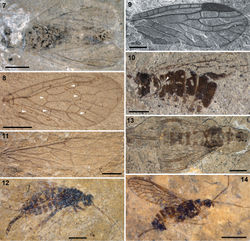Parasialidae
| Notice: | This page is derived from the original publication listed below, whose author(s) should always be credited. Further contributors may edit and improve the content of this page and, consequently, need to be credited as well (see page history). Any assessment of factual correctness requires a careful review of the original article as well as of subsequent contributions.
If you are uncertain whether your planned contribution is correct or not, we suggest that you use the associated discussion page instead of editing the page directly. This page should be cited as follows (rationale):
Citation formats to copy and paste
BibTeX: @article{Shcherbakov2013ZooKeys358, RIS/ Endnote: TY - JOUR Wikipedia/ Citizendium: <ref name="Shcherbakov2013ZooKeys358">{{Citation See also the citation download page at the journal. |
Ordo: Panmegaloptera
Familia: Parasialidae
Name
Ponomarenko, 1977 – Wikispecies link – Pensoft Profile
Diagnosis
Medium-sized insects (wings 6.5–17 mm long). Sc joining base of pterostigma; RP origin rather distal; RP and MA deeply forked; rp-ma crossvein present; MP once forked (much beyond R fork). Free base of MA developed as crossvein originating from M stem. Anal area at least 1/2 wing length. In forewing, RP+MA angled forwards at base of pterostigma, M and CuA forming long anastomosis (ending nearly level to R fork), M arched forwards distad of anastomosis, free base of MA just beyond M+CuA fork, and CuA forked. In hind wing (Fig. 6), M and CuA connected by very oblique arculus, CuA simple, and anal area variable (narrow in smaller species and broadened in larger species). Nygmata present. Veins and wing membrane evenly covered with short hairs. Short-bodied, somewhat dorsoventrally depressed. Head large, markedly transverse. Pronotum small, very short; pterothorax homonomous; legs short. Abdomen rather short, with short, well sclerotized segments. Male genitalia without prominent genital capsule, gonocoxites directed caudad, clavate gonostyles directed mediad.
Composition
Parasialis Ponomarenko, 1977 (Lower to ?Upper Permian of Eurasia; 4 species; Figs 1, 5, 7, 8), Sojanasialis Ponomarenko, 1977 (Middle Permian of Soyana; monobasic).
Remarks
In the wing structure Parasialidae are similar to Sialidae, but in the latter the R and MP forks are more proximal in the forewing, and the nygmata are absent.
The hind wings of Parasialidae differ from the forewings in the basal mcu crossvein (arculus) developed instead of M+CuA anastomosis, and CuA unbranched. The hind wing anal area is expanded, with up to six unbranched anal veins in larger parasialids, but relatively small in the smallest parasialid, Parasialis rozhkovi (likewise in Sialidae the extent of the hind wing anal area depends on the body size and abdomen mass, so that e.g. in males of smaller species of Indosialis the fore and hind wings have anal areas of equal size).
Taxon Treatment
Images
|


